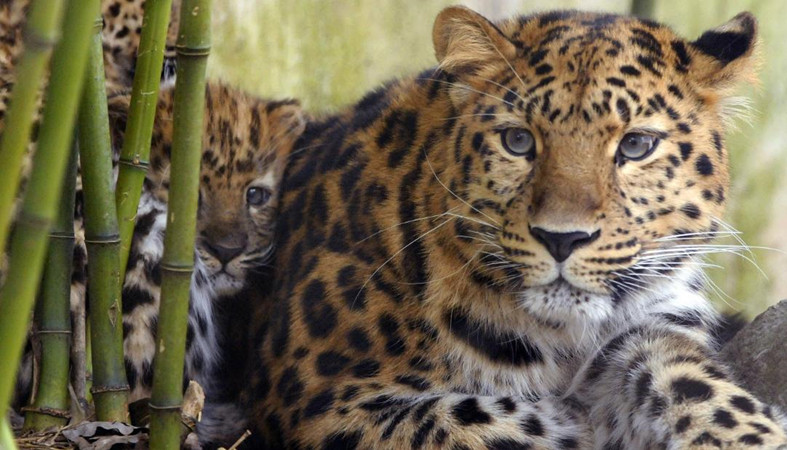(单词翻译:单击)
The sixth mass extinction is not a worry for the future. It's happening now, much faster than previously expected, and it's entirely our fault, according to a study published Monday.
第六次物种大灭绝并不是对未来的担忧。根据本周一(6月1日)发表的一项研究,这一切正在发生,比之前预期的要快得多,而且完全是人类造成的。
Humans have already wiped out hundreds of species and pushed many more to the brink of extinction through wildlife trade, pollution, habitat loss and the use of toxic substances. But the findings published in the scientific journal Proceedings of the National Academy of Sciences (PNAS) show that the rate at which species are dying out has accelerated in recent decades.
由于野生动植物贸易、污染、栖息地丧失和有毒物质的使用,人类已经导致数以百计的物种消失,并将更多的物种推向灭绝的边缘。发表在《美国国家科学院院刊》上的研究结果表明,近几十年来,物种灭绝的速度已在加快。
Gerardo Ceballos Gonzalez, a professor of ecology at the National Autonomous University of Mexico and one of the authors of the study, said approximately 173 species went extinct between 2001 and 2014.
墨西哥国立自治大学的生态学教授杰拉尔多·塞巴罗斯·冈萨雷斯是这项研究的作者之一。他说,在2001年至2014年间,大约有173个物种灭绝了。
"173 species is 25 times more extinct species than you would expect under the normal, background, extinction rate," he told CNN in an email. He and his team found that in the past 100 years, more than 400 vertebrate species went extinct. In the normal course of evolution, such extinctions would have taken up to 10,000 years, they said.
他在发送给美国有线电视新闻网的电邮中写道:“这是正常物种灭绝速度下灭绝数量的25倍多。”他和他的团队发现,在过去的100年里,超过400种脊椎动物灭绝了。他们说,在正常的进化过程中,这样的灭绝可能需要长达1万年的时间。
Mass extinctions are just as severe as their name suggests. There have been five mass extinction events in the Earth's history, each wiping out between 70% and 95% of the species of plants, animals and microorganisms. The most recent, 66 million years ago, saw dinosaurs disappear.
物种大灭绝正如其名字所暗示的那样严重。在地球历史上发生过五次大灭绝事件,每一次都导致70%到95%的植物、动物和微生物物种灭绝。最近的一次发生在6600万年前,恐龙灭绝了。
The past events were caused by catastrophic alterations of the environment, including massive volcanic eruptions or collision with an asteroid. The sixth mass extinction -- the one happening now -- is different: Scientists say it's caused by humans.
过去的大灭绝事件是由环境的灾难性变化引起的,包括大规模的火山爆发或小行星撞击地球。而如今正在发生的第六次物种大灭绝则不同:科学家表示,这次大灭绝是由人类引起的。
"It is entirely our fault," Ceballos Gonzalez said.
“这完全是人类的错”,塞巴罗斯·冈萨雷斯说。

While life on Earth has bounced back after each of these events, it took millions of years to restore the number of species.
虽然地球上的生命在每一次大灭绝事件后都有所恢复,但物种数量的恢复却要花费数百万年的时间。
"Even though only an estimated 2% of all of the species that ever lived are alive today, the absolute number of species is greater now than ever before," the scientists said. "It was into such a biologically diverse world that we humans evolved, and such a world that we are destroying."
科学家们说:“尽管在所有曾经存在过的物种中,估计只有2%存活至今,但现在物种的绝对数量比以往任何时候都要多。我们人类就是在这样一个生物多样性的世界里进化而来的,而我们正在摧毁这样一个世界。”
Ceballos Gonzalez and his colleagues said many of the species that are on the brink of extinction are concentrated in the same regions being decimated by human impacts.
塞巴罗斯·冈萨雷斯和他的同事说,许多濒临灭绝的物种都集中在被人类破坏的相同地区。
When one species in the ecosystem disappears, it erodes the entire ecosystem and pushes other species toward annihilation. The researchers use amphibians as an example of this phenomena.
当生态系统中的一个物种消失时,它会破坏整个生态系统,并将其他物种推向灭绝。研究人员以两栖动物为例来说明这一现象。
Hundreds of species of frogs and toads are suffering population declines and extinctions because of the chytrid fungus disease, which is sometimes spread into new areas by humans. Climate change is likely making the issue worse.
由于壶菌病,数百种青蛙和蟾蜍的数量正在减少和灭绝。壶菌病有时会被人类传播到新的地区。气候变化可能会加剧这一影响。
This interdependency of different species is bad news for humans, too.
不同物种之间的相互依赖对人类来说也是个坏消息。
The researchers also said the current coronavirus crisis shows how the recklessness with which people treat the natural world can backfire badly. Many of the species that are endangered or at the brink of extinction are being decimated by wildlife trade.
研究人员还表示,目前的新冠病毒危机表明,人们对待自然界的鲁莽可能会严重地伤害自身。许多濒危物种正因野生动植物贸易而大量死亡。
The researchers said this data highlights the urgency with which the world needs to act.
研究人员说,这一数据凸显了世界采取行动的紧迫性。
Later this year, the UN Convention on Biological Diversity is expected to set new global goals to combat the ongoing biodiversity crisis in the coming decades.
今年晚些时候,《联合国生物多样性公约》有望制定新的全球目标,以在未来几十年应对正在发生的生物多样性危机。


